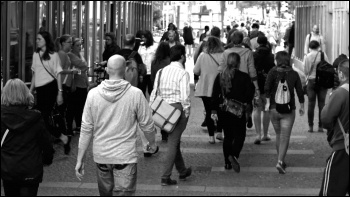
Neurodivergent Socialist Party members in the Southern and South East region
The pandemic has shown the possibility for flexible work and greater independence for workers. By allowing workers to carry out their roles from home, all kinds of accessibility barriers can be removed, and people can work in a way that suits them.
We have seen that workplaces can easily be made more accessible for workers who are disabled, struggling with their mental health, or neurodivergent – a difference in cognitive processing, for example autism.
However, it’s clear in which direction the Tories are heading. Universal Credit, that many young people rely on, has been cut. They aim to tackle youth unemployment with low-paid, short-term Kickstart Scheme jobs, many of which will be inaccessible to us.
Any disabled or neurodivergent person who has experienced discrimination in the workplace, who has struggled to find work that is compatible with their needs, or who has suffered the nightmare of applying for disability benefits and dealing with the DWP, will know full well that the Tories and the capitalist class they represent do not care about us.
We are viewed as either incapable, or simply not worth accommodating, because we do not fit the one-size-fits-all model of work that is tailored to exploit the neurotypical and non-disabled majority of workers.
The only value the capitalists understand is economic. To them, the measure of the value of our lives is the amount of profit they can extract from us. They will always consider our lives as being only as valuable as we are exploitable.
It is important that we organise, unite with other workers in the workplaces and trade unions, and make our voices heard. We must demand real living wages, an end to job cuts, accessible workplaces, and disability benefits that allow us to live well, not merely scrape by and barely subsist.
And we need to fight for a socialist society which functions on the basis of ‘from each according to their ability, to each according to their need’, regardless of what those abilities and needs might be.
A day in the life: fighting for work and benefits
Aaron Smith, North London Socialist Party
I have found it hard to find work. I am autistic and one of the main challenges is with communication. I have found that I have applied for dozens of jobs and have not heard back, which I found hard to take. I have a masters in History from the University of Bristol, I know now that I enjoy research and writing, but finding a job like that is not easy.
I have mainly had agency work as a kitchen porter in the past, but the demands in the workplace were too much. I found that there were not enough breaks, the bosses treated us like robots and expected us to work for ten to twelve hours which was exhausting. My disability means that I was unable to recover as quickly as some of the other workers. The pay was bad, £8.25 an hour, which was just above the minimum wage at the time.
I was on disability living allowance when I was younger. When this was then changed to Personal Independence Payment I was reassessed and they decided that I did not qualify. I am in the process of appealing the decision. I don’t believe they are qualified to look at mental health conditions. The whole process is dehumanising. The whole system doesn’t seem to be designed to help people, but to force people to go away. It puts a lot of people off and has been designed to be like that.
I need more specialised support in the workplace. There is a lot that is misunderstood about autism. There needs to be an understanding of the condition in the workplace and in Jobcentres. It’s like I am a bird, one of my wings is broken and I am flying around in circles.
Sometimes simple changes like being able to take five minutes break every hour would make work more manageable. Remote working would really benefit the disabled. I think a key demand should be the right to much more flexible working conditions, as it’s been proven to be successful in the pandemic.
From my perspective, any conversation around our work culture should emphasise a good life balance and a job should be there to help make the enjoyable things like leisure and hobbies and learning happen, not like now where work hardly makes ends meet, and a welfare system makes people fall into poverty and despair.
Pay and workers’ rights are important, but for me the workplace needs to be actually accessible in the first place to even get to that point. A well-funded and humane welfare system with actual disability specialists is very important to help bridge the gap from welfare to work. There is no logical reason at all why specialist help should stop once school is finished. Those who can’t work, whether temporarily or permanently, shouldn’t fall into poverty.








